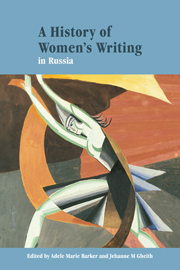Book contents
- Frontmatter
- Contents
- Notes on contributors
- Acknowledgments
- Note on transliteration
- List of abbreviations
- Introduction
- 1 Women's image in Russian medieval literature
- 2 Sappho, Corinna, and Niobe: genres and personae in Russian women's writing, 1760–1820
- 3 The inexperienced muse: Russian women and poetry in the first half of the nineteenth century
- 4 Women of the 1830s and 1850s: alternative periodizations
- 5 “A particle of our soul”: prerevolutionary autobiography by Russian women writers
- 6 The women of Russian Montparnasse (Paris, 1920–1940)
- 7 Women in Russian Symbolism: beyond the algebra of love
- 8 The eastern path of exile: Russian women's writing in China
- 9 Realist prose writers, 1881–1929
- 10 Women and gender in post-symbolist poetry and the Stalin era
- 11 Writing the female body politic (1945–1985)
- 12 In their own words? Soviet women writers and the search for self
- 13 Women's poetry since the sixties
- 14 The persistence of memory: women's prose since the sixties
- 15 Perestroika and post-soviet prose: from dazzle to dispersal
- Bibliographical guide to writers and their works
- Guide to further reading
- Index
13 - Women's poetry since the sixties
Published online by Cambridge University Press: 22 September 2009
- Frontmatter
- Contents
- Notes on contributors
- Acknowledgments
- Note on transliteration
- List of abbreviations
- Introduction
- 1 Women's image in Russian medieval literature
- 2 Sappho, Corinna, and Niobe: genres and personae in Russian women's writing, 1760–1820
- 3 The inexperienced muse: Russian women and poetry in the first half of the nineteenth century
- 4 Women of the 1830s and 1850s: alternative periodizations
- 5 “A particle of our soul”: prerevolutionary autobiography by Russian women writers
- 6 The women of Russian Montparnasse (Paris, 1920–1940)
- 7 Women in Russian Symbolism: beyond the algebra of love
- 8 The eastern path of exile: Russian women's writing in China
- 9 Realist prose writers, 1881–1929
- 10 Women and gender in post-symbolist poetry and the Stalin era
- 11 Writing the female body politic (1945–1985)
- 12 In their own words? Soviet women writers and the search for self
- 13 Women's poetry since the sixties
- 14 The persistence of memory: women's prose since the sixties
- 15 Perestroika and post-soviet prose: from dazzle to dispersal
- Bibliographical guide to writers and their works
- Guide to further reading
- Index
Summary
During the last four decades of the twentieth century, Russian women poets have drawn creative energy from the changing world around them despite often living and writing at odds with that world. They have endured the thaw, with its temporary recovery from years of war and terror, then stability and stagnation in the 1970s and early 1980s, turbulent reforms in the late 1980s, the Soviet Union's collapse in 1990, and, most recently, the emergence of a new Russian state. The poets in question experienced nearly all these historical stages, although some came to consciousness only after the sixties (Nina Iskrenko, Irina Ratushinskaia, Tat'iana Shcherbina, and Olesia Nikolaeva, born after 1950), and others met untimely deaths (Kari Unksova in 1983, Nina Iskrenko in 1995) or emigrated before the demise of the Soviet Union (Natal'ia Gorbanevskaia, Elizaveta Mnatsakanova, and Marina Temkina). A few are long-lived women who survived World War II and Stalin's Terror (Inna Lisnianskaia and Iunna Morits), whereas others (Mnatsakanova, Iskrenko, Ry Nikonova) are bold experimenters whose work traditionalists barely regard as poetry.
Despite differences in age, experience, poetic school, and aesthetic taste, these poets share complex views of Russian experience and Russian identity. Either because they witnessed dramatic political change, or because they left Russia, or because they always felt alienated from official life, they have found the question of Russian identity unresolved and often disturbing.
- Type
- Chapter
- Information
- A History of Women's Writing in Russia , pp. 264 - 276Publisher: Cambridge University PressPrint publication year: 2002

